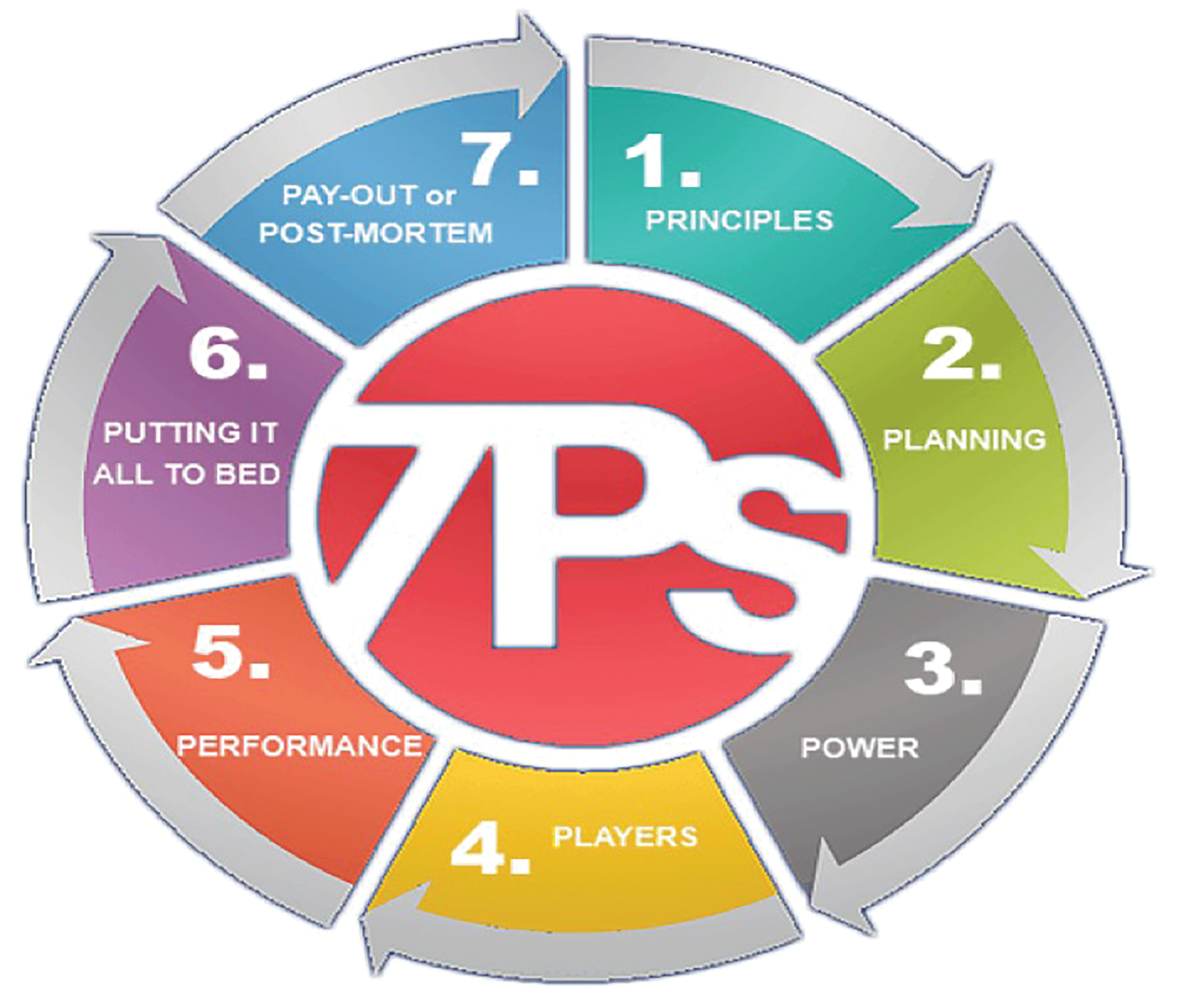The power of the seven ‘Ps’
The Cambridge Business English Dictionary defines deal-making as: ‘The activity of making business agreements or arrangements.’
SEE ALSO
- Effective deal-making: part 2
- Effective deal-making: part 3
- Effective deal-making: part 4
- Effective deal-making: part 5
Deals are pivotal to corporate growth and are being struck all the time. You will not succeed in business without striking deals. Everyone has the potential to be a good deal-closer, and it is clear that every person, organisation or nation state needs to make deals at some point, and usually quite regularly.

Organisations around the world will continue to grow, refocus, merge – and, sometimes, retrench – through making deals. Given the increasing interconnectivity – technological and otherwise –of the world’s businesses, the risks of not having a good deal-closer at the helm will increase. The need for business leaders and decision-makers to be able to effectively identify a deal’s strategic, financial and operational value and then to execute and manage it efficiently will only accelerate.
While different cultures and nationalities use different methods, processes and communication styles in deal-closing, from the beginning of time humans have been striking deals to facilitate family, trade, community and national best interests. Although cultural differences make the deal landscape even more interesting and sometimes challenging, the key elements that facilitate a deal – selling, persuading, negotiating and signing a contract – are the same the world over.
Despite the pervasiveness of deals in all aspects of our lives, little has been written about the process of effective deal-making. I have developed the 7P approach to deal-making, which covers a logical sequence to help with more effective, efficient and ethical deal-making:
Principles
This P provides an overview of some key principles in deal-closing. Following a clear strategy, using in-depth planning, engaging the right people, ensuring stringent and exacting execution, experience, intuition, good communication skills, empathy, persistence and constant monitoring are all essential ingredients for ensuring successful deal-closing. In a series of articles for the Gazette, I will explore some of the key skill-sets of a good deal-maker with particular reference to legal business, including selling, negotiating and other alternatives such as BATNA, compromise or walking away.
There is a tendency to think that a deal-closer must ‘win’ and the other side must ‘lose’. If the only thing being negotiated is money, then yes, in that circumstance, a deal can be that straightforward. But we have very rarely been part of a deal scenario where money is the only factor at play. However, the goal of creating a good deal for both parties through mutual value satisfaction is not only possible, but also the only really sustainable way to do business.
Be careful not to confuse value with fairness. Because we all have our own barometer of what is fair at any particular time, there is every chance that appealing to a higher concept of fairness when trying to conclude a deal will actually just serve to antagonise the other side.
Planning
This P demonstrates that if you fail to plan, you plan to fail. Thorough preparation and planning gives you the best opportunity to understand all the possible strengths, weaknesses, opportunities and threats in your deal-closing game plan. Do not be tempted to cut corners here. Despite the temptation to do so, never rush your strategic planning.
All successful deals begin with the right strategy, with risk analysis and measured processes in place. The tactical benefits of a well-honed strategy are that it helps you determine what you want, how you are most likely to achieve it and then to choose your optimal tools and optimal team for execution.
Speed, of course, can be important at the right time in the deal-closing proceedings, but advanced planning, clarification and preparation are even more important. Being prepared increases your ability to successfully get through difficulties on the deal journey with confidence. It is important to complete your preparations in advance as there may be limited time to stop and regroup when you are in the thick of a deal.
Power
This P demonstrates the critical importance of the power balance in deal-closing and how you can ensure you have the upper hand. It also relates to the critical issues of ensuring your organisation is culturally ready for the deal power-wise and whether any organisational change is required at this time.
Careful planning allows you to frame your preparations for maximum effect and maximum deal power, highlighting your potential deal strengths and weaknesses and providing you with the ability to fix any holes in your position. As with planning, do not cut corners. As a first step, conduct a comprehensive assessment of relative power between both sides. Your relative power directly impacts your ability to execute deals. In fact, relative power is one of the most important factors that can determine the outcome of a deal.
Deal power is a frame of mind and can be developed. Even if, initially, it looks like there is a significant imbalance of power between you and the other side, by being smart, diligent and measured a good deal-closer can readjust that imbalance – for example, by moving the discussion away from price to quality or some other emotive subject.
Power is not static. It usually ebbs and flows during a deal and can change sides very quickly. Whether you like it or not, your power is always influenced by your credibility, legitimacy, knowledge, authority, appearance and influence. Perception is an extremely powerful power source in deal-closing: perceived power can be as powerful as actual power. So focus on building the appearance (or at least the perception) of your own power.
Players
This P demonstrates how important the players involved in a deal are to the successful outcome of a deal. Regardless of your strategy and planning, the success of any deal is reliant upon the people involved.

Unless you are running a deal alone, which is rare from a corporate perspective, your choice of deal team is critically important as the shape of your team has a dramatic impact on your power. The right deal team members can enhance the knowledge, credibility, authority and perception of your team. So, who to include, who to leave out, roles and reporting methods are extremely important.
It is important to map out the key players on the other side of the deal table, as you are ultimately going to have to convince them all of your proposals. As part of the process of information-gathering to bolster your deal-closing power-base, you need to determine who is on the other side’s deal team and each person’s respective power, influence and final say in the deal-closing process. Assume at your peril that the other side’s intentions are the same as your own. So, the more you understand the other side’s motives, intentions, strengths and weaknesses, the more you can use that to your advantage.
Performance
We have now arrived at a point on the deal journey where the deal has been planned, and there is a strategy and an execution team in place. This P demonstrates the fundamental importance of deal performance itself.
While planning is critical, deal-closing is not just a theoretical exercise; practice does help to make perfect. So, in addition to planning all the strategic and tactical aspects of your deal journey, including team members and communication tactics, you should methodically rehearse how you will achieve your objectives and close the deal.
There is no formula for what you should open a deal with. Instead you must consider and balance many issues, such as relationships, where your organisation stands business-wise, who is in the deal room and so on. In our experience, you will quickly know if you have not been ambitious enough – mainly from the
speed at which the other side accepts your first proposal.
Therefore, be sure you open as ambitiously as possible, though of course be mindful of cultural differences in the way you frame your opening. Also, try to avoid making an opening offer that could offend or stress your counterpart. Unreasonably extreme offers will likely drive the other side to search for counterarguments.
The more you ask for, generally the more you can expect. Going first and as high as you can, you could end up achieving more than you might otherwise have done: you may make the other side believe they have won something by ‘bringing you down’.
Putting it to bed
You have now arrived at the all-important finale. You have strategised, planned, developed and used relationships and networks, built a team, made and received proposals, reconsidered and thrown in a fair amount of psychology, patience, wisdom and fortitude to boot. This P looks at last-minute checks and other tactics to use when you reach the deal close. It also explores the importance of memorialising and future-proofing deals to ensure good governance, risk control and implementation.
Even though you have rehearsed the close and have established the ostensible confirmation of the opposing team, you still need to ‘cross some Ts’ and ‘dot some Is’ in sealing the deal.
Summarise the deal at this point and compare where you have landed with the deal against your likely outcome. If you have fallen short, you have one last chance now to try adjusting the deal parameters, though we have rarely seen this happen at this late stage If you are successful in reframing the discussion and you achieve positive movement in the deal, then ensure that the other side explicitly agrees that this is their new understanding so as to minimise the possibility of any later conflict.
Pay-out or post-mortem
Job done – this is when you can sit back and take credit for a successful deal execution. But, sometimes, closing a deal is not always possible and you need to learn not to take such occasions to heart. Every deal – successful or otherwise – contains within it lessons for the future.
Despite your best efforts in putting a good deal on the table, the vagaries of deal-closing mean that things can – and often do – go wrong. Not all deal discussions will result in a successful deal.
Sometimes deadlock or dispute will arise. Be aware that a ‘No’ from the other side does not always mean the deal is at an end. Too often parties walk away at this point, but many times in deal discussions we have heard ‘No’ and yet we have seen a way forward. A good deal-closer will use ‘No’ as a cue to reframe and try a new tactic.
This is the first in a series of articles by Simon Haigh, a solicitor, professional coach and author. Haigh is managing director of related global advisory businesses expertdealcloser.com and gcmadvisory.com, and the author of several publications. This is an extract from his forthcoming book How to Be a Better Deal-Closer from businessexpertpress.com































1 Reader's comment